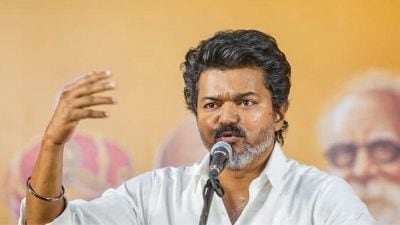A Voice in Time
Hindustani vocalist Arati Ankalikar-Tikekar on being the torchbearer of the Kishori Amonkar legacy, the voice of Sardari Begum, and how classical music isn’t entertainment
 Arati Ankalikar-Tikekar will perform in the Capital today
Arati Ankalikar-Tikekar will perform in the Capital today
In the opening scene of Sardari Begum (1996), a film in which director Shyam Benegal adopted thumri as the literal and figurative idea to tell his story, Kirron Kher is seen cooking in her kitchen, moving the ladle, while singing Chali pee ke nagar. The famed lament in Bhairavi describes the pain of a bride’s bidaai. Sardari’s love for mausiqi leads her to become a courtesan.
Sung by Hindustani classical vocalist Arati Ankalikar-Tikekar, the thumri composed by Vanraj Bhatia and penned by Javed Akhtar, remains etched as a piece defining the pain and passion of Sardari Begum, Bengal’s iconic character. Ankalikar-Tikekar, the voice of Sardari in the film, also gave us two wonderful duets Raah mein bichi hain and Ghir ghir aayee apart from raag Nand’s jewel in the crown, Ghar nahi hamare shyam. “Benegal called me to sing only one piece – Raah mein… but after I finished recording, he asked to me sing another, and then some,” says 55-year-old Ankalikar-Tikekar, who will perform on the opening day of the three-day 71st Shriram Shankarlal Music Festival in the Capital today.
Born in Bijapur to music-loving parents, who saw her love for music when she was four and would sing nursery rhymes in perfect tune, Mumbai-raised Ankalikar-Tikekar is currently based out of Pune. Tutored under Pt Vasantrao Kulkarni of the Agra-Gwalior gharana, she was 18 when iconic vocalist Kishori Amonkar took her as one of her students. It was hard for a young Ankalikar-Tikekar to not be terrified of Amonkar’s towering personality. “There was a clear diktat to wear saris if I was to learn. Salwar kameez wasn’t allowed. If she was intimidating, she was also very affectionate. If she was teaching Yaman, she’d sing and I’d repeat and would keep singing it eight hours a day for over a month, until I became Yaman,” says Ankalikar-Tikekar, a torchbearer of the Amonkar legacy that is a combination of the best from various gharanas and one clear concept — Indian music isn’t entertainment. “If it was, then we’d have thousands queuing up. This is meditation. This meditation was also the reason, why Kishori tai struggled to reach the most sublime focal point of a raga, or why she’d make sure that the tanpura is tuned perfectly even if the concert begins two hours late,” she says.
Ankalikar-Tikekar, who is a proponent of the guru-shishya parampara, has six students living with her at home. “I didn’t want to go through the red tape of the government process to get a space. So I have six girls living and learning with me. They also go to college. In today’s day and age, it’s important to be smart and know how to market one’s self,” she says.
This year, the prestigious annual festival will witness first-time performances by several young and veteran musicians, apart from morning concerts on the final day. Besides Ankalikar-Tikekar, the opening day will feature vocalist Shounak Abhisheki, trained in Agra and Jaipur style. Day two will have dhrupad maestro Uday Bhawalkar and Kolkata-based vocalist Ulhas Kashalkar, a storehouse of rare ragas. The final day will feature morning performances by veena exponent Jayanthi Kumaresh and Carnatic classical vocalist Bombay Jayashri. While Kalapini Komkali, Kumar Gandharva’s daughter will make her debut on the Shankarlal stage, the festival will conclude with a performance by renowned vocalist of the Mewati gharana, 88-year-old Pt Jasraj.








- 01
- 02
- 03
- 04
- 05



















